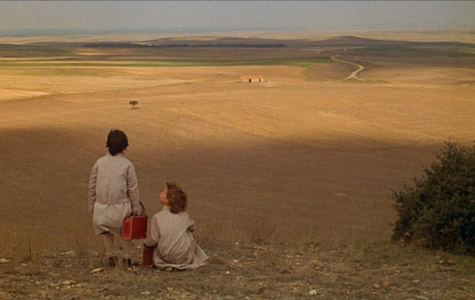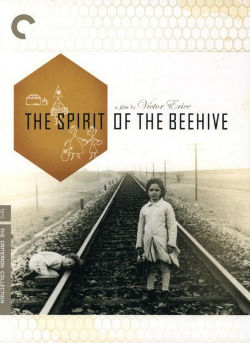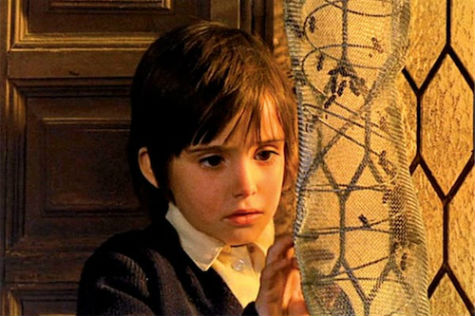
Some of the most lasting works of art are those than can be appreciated on a variety of levels. Such is the case with Victor Erice’s 1973 film The Spirit of the Beehive. A masterpiece of Spanish cinema, the movie is set in 1940, a year after the Spanish Civil War ended with the authoritarian, right wing regime of Francisco Franco defeating the left-leaning Republicans and taking control of the country. The state of Spain in the aftermath of this outcome is a constant influence throughout Erice’s meditative film. And yet someone who doesn’t know a thing about that war or Franco’s government can enjoy the movie.
Co-written by director Erice, the story is also about the emotional estrangement within a family and, more centrally, the bittersweet wonders of childhood discoveries of life and its mysteries. The family (all the characters go by the first name of the actors who play them) is: Fernando, the eccentric father, who keeps odd hours, spends a lot time in beekeeping activities and then holing up in his study and writing reflective, poetic pieces about the bees; Teresa, Fernando’s much younger wife, a beautiful woman who plays moody tunes on the piano and writes romantic letters to a lost love who is elsewhere now, perhaps displaced by the war; Isabel, the oldest child, who is a precocious girl who has an easy laugh yet who gets off on torturing the family cat and playing mean tricks on her younger sister; and that sister, Ana, is the most important character in the tale – she is a wide-eyed, innocent child who gets taken on various coming-of-age experiences over the course of the story, which is in great part seen through her eyes and heart.
 The movie has a striking look and a powerfully moody feel. Roger Ebert said of it “This is one of the most beautiful films I’ve seen.” Set in a modestly populated village, many of the film’s shots contain wide-open spaces that imbue it with a ruminative feel. And likewise with its depiction of life in the village, with scenes showing the excitement of small town pleasures like that of a train passing through, or when a new film comes to the local movie house, or the transcendent feeling aroused as kids play games around a bonfire on the vast plain. The movie that arrives in the village at the outset of the story is Frankenstein (1931), and this film dazzles the local inhabitants at its showing and it has a massive impact on the impressionable Ana.
The movie has a striking look and a powerfully moody feel. Roger Ebert said of it “This is one of the most beautiful films I’ve seen.” Set in a modestly populated village, many of the film’s shots contain wide-open spaces that imbue it with a ruminative feel. And likewise with its depiction of life in the village, with scenes showing the excitement of small town pleasures like that of a train passing through, or when a new film comes to the local movie house, or the transcendent feeling aroused as kids play games around a bonfire on the vast plain. The movie that arrives in the village at the outset of the story is Frankenstein (1931), and this film dazzles the local inhabitants at its showing and it has a massive impact on the impressionable Ana.
The early parts of the story are so mesmerizing, you don’t really care where the tale is going. But it reaches a climactic point when a lone man – a member of the group that was ousted by Franco, who is now injured and leading a hobo’s existence – jumps off a train that’s passing through the village and holes up in a barn on the family’s property. Ana discovers him there, and instead of being afraid of him, she talks to him and tries to help him, bringing him food and even handing to him her father’s coat and prized musical watch. What ultimately happens to the man, and how it affects Ana, are all things that should be learned first-hand by people who haven’t seen this film and wish to.

This was the directorial debut of Erice, who was born in the year the story takes place. He has only made three other films since, and I can’t comment on those because I have yet to see them. I have watched The Spirit of the Beehive about six times now, so maybe it’s time I let this one rest and check out Erice’s other work. But I keep coming back to Spirit because of how deeply it affects me. Its captivating tone, its quietly building yet ultimately potent emotional content, its majestic look and feel . . . I could go on. Through the sound of Fernando striking a match as he sits moodily alone in his study, through the look of Teresa’s fingertips as she hits piano keys while thinking about her distant lover, through the image of the blood that Isabel smears on her lips after she gets scratched by the cat who defends itself against her torments, and through the globes of Ana’s big eyes as she witnesses various facets of the life and people around her, we get a whole panorama, not just of a foursome of family members who have become spiritually estranged from one another, but of a whole country that has been ravaged by a war.
Brian Greene writes short stories, personal essays, and reviews and articles of/on books, music, and film. His work has appeared in over 20 publications since 2008. His pieces on crime fiction and film have been published by Noir Originals, Crime Time, Crimeculture, Paperback Parade, Mulholland Books, and Stark House Press. He is a regular contributor to The Life Sentence crime fiction web site, and Shindig! music magazine. Brian lives in Durham, North Carolina. He can be found on Twitter @brianjoebrain.
See all posts by Brian Greene for Criminal Element.
